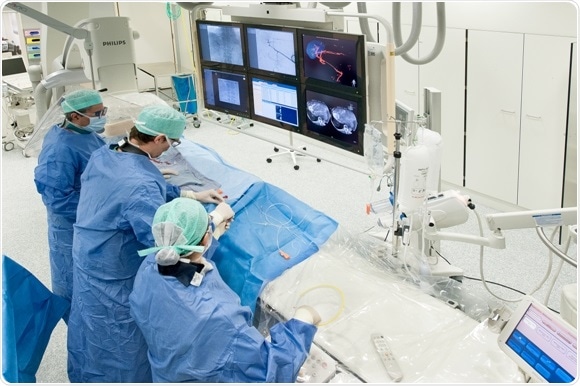Sep 13 2016
Royal Philips today announced that it will unveil its latest innovation in interventional oncology at the 2016 Cardiovascular and Interventional Radiological Society of Europe annual meeting (CIRSE 2016), which will be held in Barcelona (Spain) from September 10 until 14. Philips’ next generation interventional oncology solution OncoSuite will enable physicians to provide analysis and minimally invasive, targeted treatment of tumor lesions reducing the impact to healthy tissue. It offers clinicians a better view of the treatment targets for informed decision making, while performing the procedure.

“While OncoSuite can be used for a number of different cancers including bone, kidney and lung, the solution and its specific tools have been optimized for the treatment of patients with liver cancer,” said Dr Jeff Geschwind, Chairman and Chief of the Department of Radiology and Biomedical Imaging at the Yale School of Medicine. “Given the steady increase in the prevalence of non-alcoholic fatty liver disease and liver cancer, the development and availability of new technology is much needed to provide interventional oncologists with a breakthrough that allows best possible treatment for these patients.”
Dr. Geschwind continued:
What matters most in these cases, is the ability to visualize the liver tumors, even small ones, during the procedure and to approach them in a very targeted way to maximize the therapeutic outcome, while avoiding the destruction of healthy liver tissue. OncoSuite is designed to help us see, reach and treat liver cancer in a better way.
OncoSuite is Philips’ integrated solution to enhance tumor embolization and ablation procedures with Philips’ interventional X-ray systems. It is the only platform in the industry that supports both procedures enabling physicians to target multiple tumor lesions simultaneously. OncoSuite comprises Philips’ innovative product offerings for enhanced imaging (XperCT Dual), live 3D image guidance for tumor embolization (EmboGuide) and live 3D image guidance for tumor ablation (XperGuide). It is yet another example of Philips’ Image Guided Therapy solutions that advances minimally invasive procedures by helping physicians decide, guide, treat and confirm the right therapy for each patient.
“Minimally invasive, image-guided interventional oncology procedures are a highly effective option for patients who cannot be treated through conventional techniques such as surgery, chemotherapy or radiation therapy,” said Ronald Tabaksblat, Business Leader Image Guided Therapy Systems at Philips. “Interventional oncology procedures are rapidly increasing and OncoSuite provides the first complete interventional oncology portfolio for interventional radiologists, enabling physicians to see the entire tumor and its feeder vessels to directly target treatment avoiding healthy tissue.”
The next generation OncoSuite allows targeted treatment of an entire tumor and its feeder vessels, sparing surrounding tissue or organs. The innovative Open Trajectory function within XperCT Dual enables better centering of the liver with significantly improved visualization during the procedure of peripheral hepatic tumors in a single sweep. This feature provides a more targeted field of view making it possible to effectively scan larger patients. Previously, with the traditional geometric movement of the C-arm of the interventional X-ray system, part of the liver image was truncated and larger patients required multiple scans to visualize tumors in the periphery of the liver.
Embolization procedures involve blocking the arteries feeding a tumor with beads to deprive it of nutrients and oxygen. They require the insertion of a catheter, which must be guided to the tumor site with the aid of live image-guidance. BTG and Philips have been working in close collaboration on the visualization benefits of radio-opaque beads in combination with image-guided therapy. Together the companies have calibrated LC Bead LUMITM and Philips Live Image Guidance Software to help interventional radiologists and multi-disciplinary teams to visualize better treatment options for patients with liver cancer. As a result, the next generation OncoSuite also features the world’s first optimized imaging for LC Bead LUMITM that provides real-time visible confirmation of bead location during embolization procedures. In addition, the new Wiper Movement functionality improves workflow with automatic Dual Phase imaging, helping physicians to acquire two 3D cone beam CT datasets at different times of the procedure in a single step.
The next generation OncoSuite reflects Philips’ commitment to deliver better, more personalized care to patients, while reducing healthcare costs.